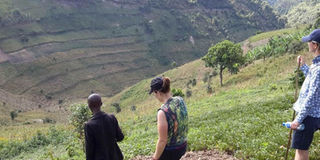Help local communities benefit from tourism, experts tell government

Tourists at the Bwindi Impenetrable National Park. FILE PHOTO
What you need to know:
- Prof Ephraim Kamuntu, the Tourism minister, lauded the Aga Khan Development Network for organising the lecture and contributing to the development of Uganda.
Kampala. Government should find innovative ways of helping communities around protected areas earn from tourism if they are to appreciate and protect the parks, experts have suggested.
Dr Dilys Roe, a researcher at the International Institute for Environment and Development (IIED), a London-based think-tank, said if communities feel that parks do not benefit them, they resort to poaching.
She made the remarks while giving a keynote address into the threats to the Bwindi Impenetrable National Park and some innovative ideas for new community-based solutions in Kampala last week. The lecture was organised by Aga Khan Development Network.
Citing their nearly two years’ experience in helping communities around Bwindi tap into tourism, Dr Roe said many people can benefit from gorilla tracking indirectly through selling items to tourists.
“Gorillas are key attraction in Uganda. They are particularly important because there aren’t many countries in the world where you can find gorillas. So the tourism market is here or in Rwanda,” she said.
“That really sounds positive, but the other side of the story is where that money goes.”
Dr Roe said local communities can earn from tourism if they are trained to work as professional guides, sell food or offer authentic cultural experiences and not necessarily wait for the 10 per cent park revenue ploughed back by government.
Training
She said IIED has already trained some residents to offer the services.
Gorilla-tracking in Bwindi generates revenue for conservation, but local benefits from tourism are limited and the illegal use of the park’s resources continues.
Tourism is a top foreign exchange earner and Uganda last year raked in $1.4b (Shs5 trillion) from the sector, according to government statistics.
Mr Amin Mawji, the Aga Khan Development Network representative in Uganda, said the lectures are aimed at creating “a space for conversation... a space for illumination where leaders and opinion formers can come together to reflect on the big issues of our time, to explore new ideas and fresh perspectives, and to promote new solutions to the problems that face us and our children.”
The lecture examined some of the challenges facing the tourism sector.
Prof Ephraim Kamuntu, the Tourism minister, lauded the Aga Khan Development Network for organising the lecture and contributing to the development of Uganda.
He said government is committed to conserving the environment but sometimes they are let down by rampant poverty among Ugandans, bad attitude and the growing population of people and animals that compete for space.
The lecture was attended by Mr Daudi Migereko, the chairman of Uganda Tourist Board, several ambassadors and senior leadership of the Uganda Wildlife Authority.



